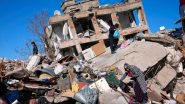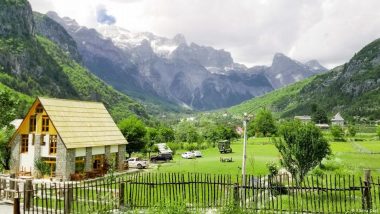Albania seeks to scrub stereotypes of poverty, criminality and blood feuds to persuade tourists to visit. But can it exploit its natural and cultural treasures without wrecking its potential as an undiscovered gem?For those flying in from German and Austrian hubs, the first sight of Albania is usually of the Dajti mountain brooding over Tirana. The shadow it casts across the capital perfectly matches the mystery that engulfs the country in most minds.
Also Read | India News | DCW Chief Writes to DGCA to Prevent Unruly Behaviour Against Women on Flights.
After taking power during the Second World War, Enver Hoxha — whose authoritarian rule of Albania lasted from 1944 until his death in 1985 — sealed off the country for four decades, outlawing travel and religion. Over 500,000 concrete bunkers sprang from his paranoia onto the country's beaches, mountains and plains, many remaining to this day.
This long and haunted isolation, allied to the vicious wars that stalked the western Balkans in the 1990s, has helped turn Albania into Europe's least known and most enigmatic country.
That means that for the uninitiated, the images that spring to mind stem from its grim communist past. But while corruption and criminality can be found, as in all European countries, Albania is still one of the last unspoiled corners of Europe.
The Accursed Mountains in the north offer one of the continent's last wildernesses to hikers and climbers. Golden sand beaches run down the Adriatic and Ionian coasts to the city of Saranda, which sits just across the Greek island of Corfu. Across this southern region runs the Vjosa, one of Europe's last wild rivers, soon to be protected within a national park.
Albania is now beckoning visitors to discover not only these stunning landscapes, but also the country's Mediterranean-Balkan hybrid cuisine — featuring specialties such as Tave Kosi or Fergese — which can be catered by over 250 ecotourism hosts, a sector the government is keen to promote.
A plethora of Greek, Roman and Ottoman ruins and archaeological sites also punctuate the country, such as the UNESCO-listed Butrint National Park, the Ottoman-era city of Berat, or the ancient city of Apollonia.
The bonus for visitors, says Gazi Haxhia, CEO of travel agency Landways who has been enthusiastically pushing his country's tourism potential for over two decades, is that all of these treasures can be enjoyed without struggling through crowds.
"Albania is still relatively undiscovered," Haxhia boasts. "We've not been overrun with mass tourism, so visitors can still enjoy unspoiled natural beauty, unique culture and authentic experiences."
Warm welcome
However, some are starting to wonder just how long that will remain the case, as tourist numbers start to rise.
The pandemic gave Albania a leg up. Neighboring tourism stars were hard hit by COVID. Croatia, whose sparkling Adriatic coastline tends to dominate tourist flows heading into this south-eastern corner of Europe, saw visitor numbers drop by 68% in 2020, as restrictions crimped travel. Montenegro fared even worse, as tourist flows dropped by 83%.
Softer restrictions saw Albania trim the pullback to 59%, and numbers have quickly rebounded. A record 7.5 million arrived last year.
"The recovery has been quicker and stronger than expected," Haxhia says. Although developments regarding COVID restrictions in Asia, Russia's war in Ukraine, and the economic downturn in Europe make it hard to gauge, he says and hopes for another record in 2023.
On top of the country's natural and historical treasures, the hospitality of Albanians and their eagerness to share their culture and traditions are important selling points, he claims.
Tolerance and hospitality are the basis of a tradition called "Besa." One of Albania's proudest boasts is that the country — which is Muslim-majority — was the only one in Europe to have a larger Jewish population in 1945 than in 1939.
Haxhia notes that his clients, who largely hail from European states such as Germany, the UK and Italy, also appreciate the low costs of a trip to Albania. Increasingly, he adds, travelers from the US and Asia are starting to discover the tiny country sitting just across the Ionian Sea from the heel of the Italian boot.
'Tourism champion'
The potential of tourism is so significant that Prime Minister Edi Rama dreams of making the country the region's "tourist champion" by the end of the decade.
One of Europe's poorest countries, Albania's emerging economy depends heavily on agriculture and mining. But tourism is viewed as a key driver of modern economic development.
Pre-pandemic, the $2.3 billion or so the sector brought in annually constituted close to 16% of GDP. Rama hopes that a strong government push will help double that share.
Progress is clear to see. The rubbish piles that in past decades blighted towns and roadsides have been cleared. Transport infrastructure is being expanded and upgraded. Encouraged by tax breaks, hotels and resorts are rising.
"But there's still more to be done," Haxhia points out. "The quality of services and infrastructure remains a challenge, particularly in rural areas."
Indeed, although Albania's transport infrastructure has undergone significant improvement over the past two decades, crucial gaps remain.
While a second international airport opened in 2021 in the northern city of Kukes, with seasonal flights linking it to Germany, Austria and Turkey, getting to the Albanian Riviera in the south requires either a five-hour drive from Tirana or a flight to Corfu and then a ferry.
A third airport, being built near the city of Vlore should help. "Tourists have had a hard time getting to Albania in the past," Mirela Kumbaro, minister of tourism and environment minister tells DW, "but, all infrastructure investments are being made to serve tourism."
The government is also working with investors to build several giant resorts. Announcing a €2-billion deal with the UAE's Eagle Hills development company in January, Rama branded the project to transform the port city of Durres "a locomotive" to accelerate economic development and allow Albania to compete on the international tourism market.
Tread carefully
But at the same time, such schemes come mired in controversy. The sums of money rinsing through the system are seen as a corruption risk, and claims of sleaze and lax control are not uncommon.
The threat posed by regulators looking the other way as such behemoths advance on Albania's virgin territories are clear. Europe's Mediterranean coast is plagued by unsympathetic development, environmental damage, and over-tourism.
Although an enthusiastic proponent of the need for further development of the tourism sector, Haxhia recognizes the need to tread carefully.
"The government must enhance accessibility further, but should also promote sustainable tourism practices and training while it does," he suggests. "We need to preserve the country's natural and cultural assets for future generations."
And despite her government's rush to build motorways, airports and resorts, Kumbaro says that's exactly her remit. It's no coincidence, she insists, that her ministry is responsible for both tourism and the environment.
"Last year we had 7.5 million tourists," she declares. "But we don't plan increase the numbers. Instead, we target tourists who spend and who empower the development of sustainable tourism."
Edited by: Elizabeth Grenier
(The above story first appeared on LatestLY on Mar 15, 2023 03:08 PM IST. For more news and updates on politics, world, sports, entertainment and lifestyle, log on to our website latestly.com).













 Quickly
Quickly






















